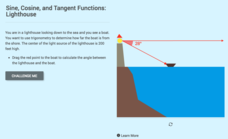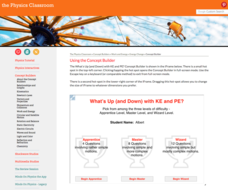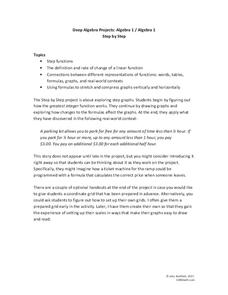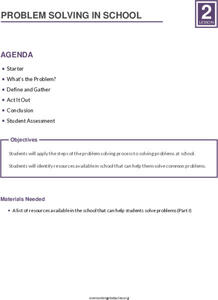Constitutional Rights Foundation
Arizona v. United States — States and Immigration Law
As part of a study of immigration law, class members read a summary of the Supreme Court case, Arizona v. United States. They then examine a series of examples and acting as federal court judges, must determine if the scenarios...
McGraw Hill
Cosmology
Explore the birth and possible death of the universe. An interactive simulation allows learners to manipulate the Hubble Constant to model the expansion of the universe from birth. Varying the constant provides different scenarios for...
CK-12 Foundation
Sine, Cosine, and Tangent Functions: Lighthouse
How far is that boat from the lighthouse? Scholars create diagrams to represent a scenario given the angle of depreciation from a lighthouse to a boat. Learners apply the basic trigonometric functions to find various distances...
National Nanotechnology Infrastructure Network
Help or Hype: The Ethics of Bio-Nanotechnology
Ethical concerns are not always black and white. A well-designed lesson presents learners with scenarios for which ethics may come into question. Scholars learn to consider the different sides of a situation and make an unbiased...
Social Media Toolbox
Ethical Decision Making
When faced with a dilemma, how do journalists decide how much news to use? Social media scholars explore the philosophies of ethical resolution in the first of a 16-part Social Media Toolbox series. Partnered pupils use a Potter Box to...
Physics Classroom
Polarization
Are your young physicists static-savvy? Test their skills using an engaging interactive from the Static Electricity series! Learners evaluate scenarios to determine how charges move between conductors and insulators, then identify...
Physics Classroom
What's Up (and Down) with KE and PE
Physics class has its ups and downs ... especially when it involves energy concepts! Scholars analyze information to determine changes in kinetic and potential energy using an interactive resource. Realistic scenarios make connecting...
5280 Math
Step by Step
One step at a time! A seemingly linear relationship becomes an entirely new type of function. Young scholars build their understanding of step functions by completing a three-stage activity that incorporates multiple representations of...
US Institute of Peace
Simulation on the Israeli-Palestinian Conflict
Why do Israel and Palestine have a history of conflict? Learners find out by participating in a simulation. They work through a scenario and take on one of 27–30 roles. They put themselves in the shoes of people from Israel, Palestine,...
College Board
2016 AP® Microeconomics Free-Response Questions
How can a bakery—one of several in town—maximize its profits? A case study from College Board asks scholars to consider the question. Other practice queries examine the price and benefits of buying certain goods for one consumer and look...
College Board
2018 AP® Microeconomics Free-Response Questions
How much should Nirali study for her history and economics exams if she has a limited amount of time for both? Scholars consider opportunity cost in using this real-world scenario from College Board. Other questions include looking at a...
US Institute of Peace
Observing Conflict
Identifying conflict is important, but how do you handle conflict when it comes? Students use a plot mountain to graph two role-play scenarios about interpersonal conflicts.
Eau Claire Area School District
Intellectual Property Lesson Plans
Fair use, intellectual property, public domain ... what does it all mean? Scholars act as judges to determine if different scenarios constitute fair use. They also advance their research skills by practicing paraphrasing and citing...
Thoughtful Learning
Recognizing Bullying
Boost social awareness with an activity that challenges scholars to recognize bullying. Participants read 10 scenarios and respond after carefully examining behaviors such as body language, facial expressions, and frequency.
Nemours KidsHealth
Getting Along: Grades 9-12
Wouldn't it be lovely if we could all just get along! Fortunately, the skills needed to build and maintain healthy relationships can be learned. Two activities help high schoolers build these skills. First, a class member reads a series...
Nemours KidsHealth
Cyberbullying: Grades 9-12
A bully, a victim, and a bystander—far from the beginning of a joke, cyberbullying is no laughing matter. Bystander or upstander? As part of the study of cyberbullying, high schoolers first read a series of articles about cyberbullying...
Health Smart Virginia
Social Awareness: Empathy
As part of the unit on social, emotional health, seventh-graders examine the difference between a growth mindset and a fixed mindset. Pairs then engage in an activity that analyzes a scenario and role play resolution strategies that show...
Health Smart Virginia
Let’s Talk Emotions
A presentation guides a discussion and opportunity for role-playing about identifying and talking about emotions. To begin, scholars share memories of happiness and unhappiness and how they responded to specific feelings. Then, learners...
Newseum
Introduction to the First Amendment: What’s a Violation?
Young historians take an in-depth look at the five freedoms granted by the First Amendment. Groups apply their knowledge of the freedoms to a series of scenarios to decide if the depicted actions represent a violation of the amendment.
Overcoming Obstacles
Coping Skills
A lesson brings awareness to a variety of emotions. After discussing the many types of emotions, scholars create a list sorting emotions as easy and hard and then brainstorm coping skills. Pupils draw a picture depicting a scenario that...
Overcoming Obstacles
Problem Solving in School
Scholars learn how to be part of the solution to problems high schoolers face. After identifying problems at their school, participants list cues that indicate each problem, note campus resources available to help solve the problem, and...
Overcoming Obstacles
Learning to Be Assertive
After defining passive, aggressive, and assertive, class members role-play different scenarios demonstrating these behaviors. Individuals then identify a weakness they wish to improve and, using what they have learned throughout the...
Overcoming Obstacles
Empathy
A lesson boosts relationship skills with a focus on empathy. Scholars define it, offer examples, and practice showing empathy with scenario cards. Five steps assist class members in empathizing in the classroom, home, and community.
Overcoming Obstacles
Handling Peer Pressure
Class members participate in a discussion to identify all types of positive and negative peer pressure and brainstorm strategies to not give in to negative peer pressure. Scholars create a T-chart to record their observations....
Other popular searches
- Bullying Scenarios
- Crime Scenarios
- Decision Making Scenarios
- Bullying Scenarios Role Play
- Drug Use Scenarios
- Crime Scene Scenarios
- Peer Mediation Scenarios
- Business Scenarios
- Mediation Scenarios
- Homicide Crime Scenarios
- 67 Bullying Scenarios
- Robbery Crime Scenarios























